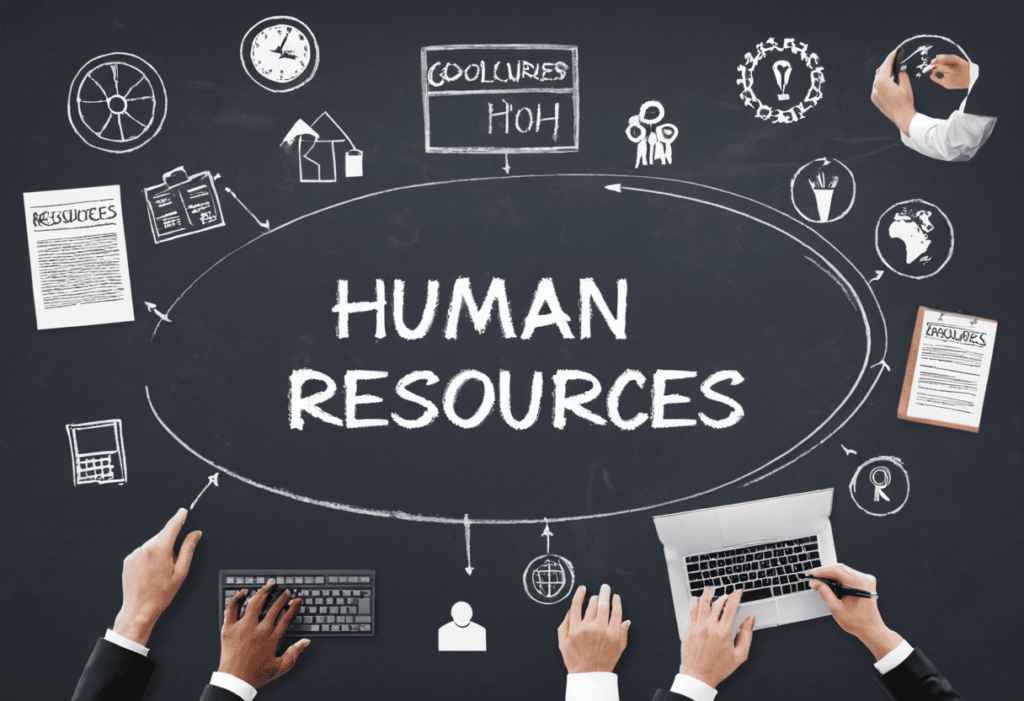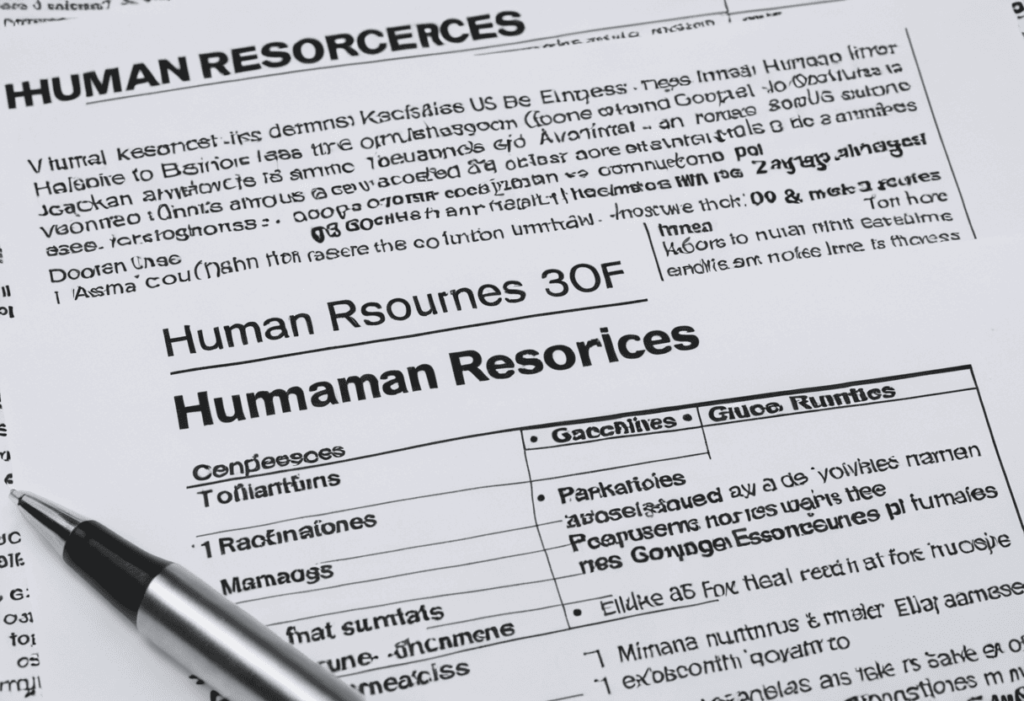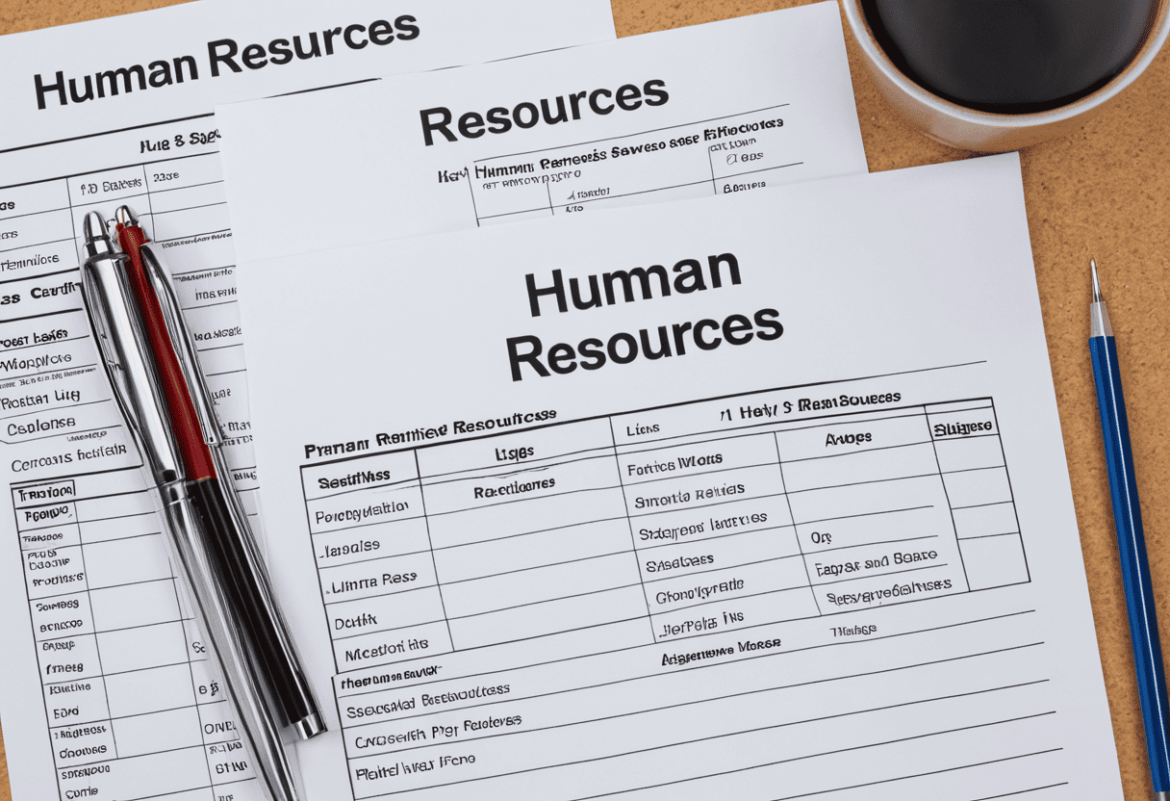Human Resources (HR) is the heartbeat of any organization, playing a vital role in shaping a positive workplace culture, driving employee engagement, and fostering growth.
With the right HR strategies, companies can build a motivated, high-performing team that propels the business forward. As the landscape of work continues to evolve, so too does the role of HR, adapting to meet the needs of both employees and organizations in a rapidly changing world.
This article explores the transformative impact of Human Resources and its essential contributions to organizational success.
Human Resources Definition
Human Resources (HR) refers to the department within an organization responsible for managing all aspects related to the people who work there. From recruiting and hiring to training, development, and employee well-being, Human Resources plays a crucial role in aligning an organization’s workforce with its strategic goals.
By effectively managing human capital, HR fosters a supportive and productive work environment, ensuring that each team member can contribute to the organization’s success while also fulfilling their individual career goals.
Importance of Human Resources in Business
The role of Human Resources in business is foundational, as it directly influences an organization’s success. Here are several ways HR contributes to business growth and stability:
- Talent Acquisition: Human Resources ensures that the organization attracts and recruits individuals with the right skills and qualifications, aligning new hires with the company’s long-term objectives.
- Employee Development: Through training and development programs, HR helps employees build and refine their skills, making them more productive and prepared for future roles.
- Workplace Culture: HR fosters a positive work environment by promoting company values, addressing workplace conflicts, and building an inclusive culture that enhances employee satisfaction.
- Legal Compliance: By ensuring that the organization complies with labor laws and regulations, HR protects the business from legal issues and potential penalties.
- Employee Retention: Through competitive benefits, career growth opportunities, and recognition programs, HR increases employee retention, reducing turnover costs and preserving institutional knowledge
Read Also : Best Course For HR in 2025 : The Ultimate Guide
How HR shapes company culture and employee productivity
Human Resources plays a pivotal role in shaping a company’s culture and boosting employee productivity. Here’s how HR contributes to creating a positive and productive work environment:
- Establishing Core Values: HR defines and communicates the company’s core values, ensuring that employees understand and embody them in their daily work, which strengthens a shared sense of purpose.
- Promoting Inclusivity and Diversity: By implementing diversity and inclusion programs, HR fosters a culture where all employees feel valued and respected, enhancing team collaboration and innovation.
- Encouraging Open Communication: HR establishes channels for open communication, giving employees a voice in company matters and creating an atmosphere of transparency and trust.
- Employee Engagement Programs: Through initiatives like team-building activities, feedback sessions, and recognition programs, HR keeps employees engaged, motivated, and committed to their work.
- Work-Life Balance Support: By offering flexible work arrangements and wellness programs, HR helps employees maintain a healthy work-life balance, reducing stress and enhancing productivity.
- Performance Management: HR implements performance evaluation systems that provide constructive feedback, helping employees improve their skills and stay aligned with the company’s goals.
Read Also : Complete Guide: Training and Development Courses for HR

Human Resources Duties and Responsibilities
Human Resources encompasses a wide range of duties and responsibilities that are crucial to organizational success. Here are some of the core responsibilities HR handles:
- Recruitment and Staffing: HR manages the entire recruitment process, from job posting and candidate screening to interviewing and hiring, ensuring the company attracts and retains the best talent.
- Onboarding and Training: HR oversees the onboarding process to integrate new hires smoothly into the organization. They also provide ongoing training and development programs to support employee growth and skill-building.
- Employee Relations: HR maintains positive employee relations by addressing workplace issues, mediating conflicts, and creating policies that foster a respectful and supportive work environment.
- Compensation and Benefits: HR designs and administers competitive compensation packages, including salaries, bonuses, and benefits, to attract and retain talent.
- Performance Management: HR implements performance appraisal systems that help track employee performance, provide feedback, and set goals for improvement and growth.
- Compliance with Labor Laws: HR ensures that the organization complies with all local, state, and federal labor laws, helping to mitigate legal risks and protect the rights of employees.
- Health and Safety: HR develops health and safety protocols, organizes training, and ensures a safe workplace environment in compliance with regulatory standards.
- Employee Engagement: HR creates initiatives to boost morale, recognize achievements, and encourage active participation in company activities, enhancing employee engagement and satisfaction.
Read Also : Guide to Finance for HR Professionals Course 2025
Key HR Activities
Human Resources manages various activities essential for the smooth operation and growth of an organization. Here are some of the key HR activities:
- Workforce Planning: HR analyzes the company’s current and future staffing needs to ensure that the organization is adequately resourced to meet its goals.
- Recruitment and Selection: HR identifies job openings, sources qualified candidates, and selects individuals whose skills and experience align with the company’s requirements.
- Employee Development and Training: Through ongoing training programs, HR enhances employees’ skills, preparing them for advancement and supporting organizational growth.
- Performance Management: HR establishes performance metrics, conducts regular reviews, and provides feedback to help employees meet their potential and align with business objectives.
- Compensation and Benefits Administration: HR designs and manages salary structures, bonus plans, and employee benefits to attract and retain talent.
- Employee Engagement and Retention: HR implements initiatives to engage employees, recognize their achievements, and foster a positive work environment that promotes loyalty and reduces turnover.
- Compliance and Legal Management: HR ensures the company’s policies and procedures comply with employment laws and regulations, protecting the organization from legal issues.
- Health and Safety Management: HR establishes health and safety protocols, provides necessary training, and ensures that the workplace meets safety standards.
Read Also : How to choose the Best short courses for hr professionals
How Does HR Support Employees?
Human Resources provides essential support to employees, ensuring they feel valued and empowered within the organization. Here are key ways in which HR supports employees:
- Guidance and Counseling
HR offers guidance on career development, personal issues, and work-related challenges, ensuring employees feel supported in all aspects of their lives. - Professional Development
HR organizes training and workshops to help employees improve their skills and advance their careers, empowering them to reach their full potential. - Conflict Resolution
HR mediates conflicts and provides fair solutions, creating a harmonious workplace where employees feel their voices are heard and respected. - Health and Wellness Programs
HR offers wellness programs, including mental health resources, gym memberships, and wellness days, promoting a balanced and healthy lifestyle for employees. - Work-Life Balance
HR provides flexible work options, such as remote work and flexible hours, helping employees manage their personal and professional lives effectively. - Benefits and Compensation Support
HR ensures that employees receive fair compensation, comprehensive benefits, and clear information about their financial and health-related entitlements. - Recognition and Rewards
HR implements recognition programs to celebrate achievements and reward employees, fostering motivation and a sense of appreciation. - Open Communication Channels
HR maintains open communication with employees through regular meetings, surveys, and feedback sessions, ensuring employees feel connected and engaged with the company.
Read Also : Leading Strategic HR Transformation Course in Amsterdam
HR Jobs and Career Paths
Human Resources offers diverse career paths, allowing professionals to specialize in various functions or grow into leadership roles. Here are some prominent HR jobs and career paths:
- HR Generalist
An HR Generalist handles a wide range of HR functions, including recruitment, employee relations, performance management, and benefits administration, providing comprehensive support across the organization. - Recruitment Specialist
A Recruitment Specialist focuses on sourcing, interviewing, and hiring candidates. They work to match the right talent with the right roles, ensuring the organization attracts and retains top talent. - Training and Development Manager
This role involves designing and implementing training programs to develop employees’ skills and support their professional growth, fostering a culture of continuous learning within the organization. - Compensation and Benefits Manager
Compensation and Benefits Managers design and manage employee pay structures, benefits packages, and incentive programs to ensure competitive and fair compensation for all employees. - Employee Relations Specialist
An Employee Relations Specialist addresses workplace issues, mediates conflicts, and ensures a positive work environment where employees feel respected and valued. - HR Consultant
HR Consultants provide expert advice to organizations on specific HR challenges, such as restructuring, policy development, or employee engagement strategies, often working on a project basis. - HR Business Partner
An HR Business Partner works closely with senior management to align HR strategies with business goals, acting as a strategic advisor on workforce planning, talent management, and organizational development. - Chief Human Resources Officer (CHRO)
The CHRO is the top HR executive responsible for overseeing all HR functions, developing HR strategies, and ensuring that HR initiatives align with the organization’s mission and goals

Most Important Skills for HR Professionals
HR professionals need a unique set of skills to succeed in managing and supporting an organization’s workforce effectively. Here are some of the most important skills for HR professionals:
- Communication Skills
Strong communication is essential for HR, as professionals must convey policies, provide feedback, and resolve conflicts in a clear and respectful manner. - Empathy and Emotional Intelligence
Empathy allows HR professionals to understand and address employee concerns, creating a supportive work environment and strengthening employee relations. - Organizational Skills
HR involves managing multiple responsibilities, from recruitment to performance evaluations, so strong organizational skills are critical for handling tasks efficiently and meeting deadlines. - Problem-Solving Skills
HR professionals often face complex issues, such as workplace conflicts or performance challenges, and need strong problem-solving skills to develop effective solutions. - Knowledge of Labor Laws
An understanding of labor laws and regulations is essential for ensuring compliance and protecting the organization from legal risks. - Adaptability
The HR field is constantly evolving, so adaptability is crucial for keeping up with changes in workplace trends, technology, and regulatory requirements. - Conflict Resolution
HR professionals need conflict resolution skills to mediate disputes, foster collaboration, and maintain a positive workplace culture. - Data-Driven Decision-Making
Using HR metrics and data analysis, HR professionals can make informed decisions about hiring, employee engagement, and performance management.
Human Resources Salary and Compensation
Salaries and compensation in Human Resources can vary widely based on the role, level of experience, and location. Here are some factors that influence HR salaries and the typical compensation for common HR roles:
- Entry-Level Positions
Entry-level roles, such as HR Assistants or HR Coordinators, generally have a starting salary range that reflects the basic responsibilities of supporting recruitment, onboarding, and employee records. - Mid-Level Roles
Mid-level positions, like HR Generalists or Recruitment Specialists, offer higher compensation as they require experience and specialized skills in areas like talent acquisition, employee relations, and benefits administration. - Specialized HR Positions
Roles with specific expertise, such as Compensation and Benefits Managers or Training and Development Managers, often come with competitive salaries due to the advanced knowledge and skills needed for these specialized functions. - HR Management
HR Managers, who oversee a team and are responsible for broader HR functions, typically earn a higher salary to reflect their leadership role and increased responsibilities. - HR Business Partners
HR Business Partners work closely with senior leadership, aligning HR strategies with business goals. Their compensation is often higher due to the strategic importance of their role and their influence on organizational success. - Executive-Level HR
Senior executives, such as Chief Human Resources Officers (CHROs), earn the highest salaries in HR, reflecting their responsibility for shaping the organization’s HR strategy and leading the HR department. - Additional Benefits and Bonuses
In addition to salaries, HR professionals may receive bonuses, profit-sharing options, and benefits like healthcare, retirement plans, and professional development allowances, adding to their overall compensation package.
Factors influencing Human Resources salary
Several factors influence the salaries of Human Resources professionals, determining their earning potential across different roles and industries. Here are some key factors:
- Level of Experience
HR professionals with more experience, especially in specific areas such as recruitment, employee relations, or compliance, tend to earn higher salaries as they bring valuable knowledge and expertise to the role. - Education and Certifications
Advanced degrees in HR or business, as well as certifications like SHRM-CP, PHR, or CIPD, can enhance an HR professional’s qualifications, leading to higher compensation. - Job Role and Responsibilities
Specialized or senior roles, such as Compensation and Benefits Manager or HR Business Partner, typically command higher salaries due to the additional expertise and strategic responsibilities required. - Industry
The industry can significantly affect HR salaries, with sectors like technology, finance, and healthcare often offering higher pay due to their competitive nature and demand for specialized HR skills. - Company Size
Larger organizations generally offer higher salaries for HR roles due to the increased scope of responsibilities and complexity in managing a larger workforce. - Geographic Location
Location influences HR salaries, with HR professionals in major metropolitan areas or regions with high living costs typically receiving higher compensation to offset these expenses. - Performance and Results
Some companies offer performance-based bonuses or incentives for HR professionals who contribute to achieving key organizational goals, such as reducing turnover or improving employee engagement.
Strategic Human Resource Management (SHRM)
Strategic Human Resource Management (SHRM) is a proactive approach that aligns HR practices with an organization’s long-term objectives to drive business success. Here are the core elements of SHRM:
- Alignment with Business Goals
SHRM ensures that HR strategies are directly linked to the company’s overall goals, such as expanding into new markets, increasing productivity, or improving innovation. - Workforce Planning
Through SHRM, HR identifies future workforce needs, considering factors like skill gaps and demographic changes, to ensure the organization has the right talent to meet strategic goals. - Talent Management
SHRM involves recruiting, developing, and retaining top talent. This includes implementing programs for leadership development, succession planning, and employee engagement. - Performance Management
SHRM integrates performance management with organizational objectives, setting clear expectations and regularly evaluating employee contributions toward achieving strategic targets. - Change Management
HR plays a critical role in managing organizational change, helping employees adapt to new processes, technologies, and structures as the organization evolves. - Employee Engagement and Culture
SHRM emphasizes building a positive workplace culture and improving employee engagement, ensuring that employees are motivated and aligned with the company’s mission. - Data-Driven Decision-Making
Using HR analytics, SHRM enables HR leaders to make informed, data-driven decisions that optimize workforce performance and contribute to business outcomes.
The role of SHRM in organizational development
Strategic Human Resource Management (SHRM) plays a crucial role in driving organizational development by aligning HR functions with the company’s long-term growth goals. Here’s how SHRM contributes to organizational development:
- Enhancing Workforce Competency
SHRM focuses on recruiting and developing employees with the skills needed to meet future challenges, ensuring the organization has a skilled and adaptable workforce. - Fostering a Growth-Oriented Culture
By promoting values like innovation, collaboration, and continuous learning, SHRM helps shape a positive workplace culture that supports the company’s vision for growth. - Supporting Leadership Development
Through leadership programs and succession planning, SHRM ensures that there is a pipeline of capable leaders ready to guide the organization through growth and change. - Driving Organizational Agility
SHRM prepares employees to adapt to changes in the business environment, helping the organization remain agile and resilient in the face of market fluctuations or industry shifts. - Aligning HR with Business Strategy
SHRM aligns HR activities with the organization’s strategic objectives, ensuring that all HR efforts directly support business goals, from talent acquisition to performance management. - Improving Employee Engagement
SHRM implements initiatives to boost employee engagement, creating a motivated and committed workforce that contributes to higher productivity and overall organizational success. - Utilizing Data for Informed Decision-Making
By leveraging HR analytics, SHRM enables leaders to make evidence-based decisions that enhance efficiency and effectiveness in workforce management and development.

Challenges and Future of Human Resources
Human Resources is facing numerous challenges as it adapts to a rapidly changing work environment, but these challenges also present opportunities for future growth and transformation. Here are some key challenges and future trends in HR:
- Adapting to Remote and Hybrid Work
With the rise of remote and hybrid work models, HR must navigate new challenges in employee engagement, productivity tracking, and maintaining a cohesive company culture across virtual teams. - Attracting and Retaining Talent
In a competitive job market, HR faces the ongoing challenge of attracting top talent and retaining skilled employees by providing career development, flexible work options, and a strong organizational culture. - Diversity, Equity, and Inclusion (DEI)
As DEI becomes a priority, HR is tasked with implementing inclusive hiring practices and creating a work environment where all employees feel valued and supported. - Leveraging HR Technology and Analytics
HR is increasingly adopting advanced technologies and data analytics to streamline processes, improve decision-making, and personalize employee experiences, requiring HR professionals to adapt to new tools. - Employee Well-Being and Mental Health
HR must address the growing importance of mental health and wellness, creating programs that support employees’ physical and emotional well-being to reduce burnout and enhance productivity. - Managing Organizational Change
As organizations adapt to new business models, HR plays a critical role in managing change, helping employees transition smoothly through restructuring, mergers, and digital transformation. - Future of Skill Development
With the pace of technological change, HR will focus more on continuous learning and upskilling, ensuring employees have the skills to meet future business needs and keep pace with industry trends.
Unlock Your Potential: Master HR with Our Expert-Led Courses and Boost Your Career!
Ready to take your Human Resources skills to the next level? Our expert-led courses at BMC are designed to equip you with the latest HR strategies, tools, and techniques to excel in today’s dynamic work environment. Whether you’re new to HR or looking to advance your career, our courses provide the knowledge and confidence to succeed. Discover how you can make a meaningful impact in your organization—enroll today and start transforming your HR journey!
Conclusion
In today’s evolving business landscape, Human Resources plays a vital role in shaping the success and sustainability of organizations. From fostering a positive work culture to implementing strategic HR practices that align with business goals, HR professionals are key drivers of organizational growth and employee satisfaction.
By understanding the diverse aspects of HR and continually enhancing their skills, professionals in this field can unlock new opportunities and make a lasting impact.
If you’re ready to take your HR career to new heights, consider exploring BMC’s expert-led courses to gain the knowledge and tools needed to thrive in this rewarding profession.
FAQs
What are the main Human Resources Duties?
The main HR duties include recruitment, onboarding, training and development, managing employee relations, administering compensation and benefits, ensuring compliance with labor laws, and fostering a positive workplace culture.
How can HR improve employee engagement?
HR can boost employee engagement by promoting open communication, implementing recognition and reward programs, providing opportunities for career development, and supporting work-life balance through flexible policies.
What are the most important skills for HR professionals?
Key skills for HR professionals include strong communication, empathy, problem-solving, organizational abilities, knowledge of labor laws, and adaptability to handle diverse challenges effectively.
How does the Human Resources hierarchy work?
The HR hierarchy typically starts with entry-level roles like HR Assistants, progressing to specialists and generalists, then to HR Managers and Business Partners, and ultimately to Directors and the Chief Human Resources Officer (CHRO) at the top.
What factors influence Human Resources salary?
Factors influencing HR salaries include experience level, education and certifications, specific job role, industry, company size, geographic location, and performance-based incentives.


